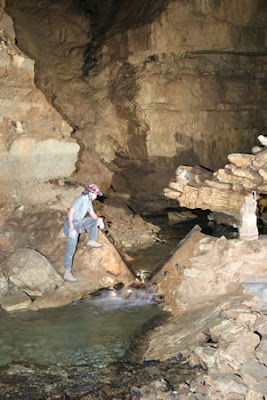As a spelunker can eventually attest, cave systems are far from uninhabited. From the mouth to the cave to the underground rivers that carve it, caves provide a home, transient or otherwise, for a broad assortment of wildlife.
Image source: wired.com
The mouths of caves provide a cool environment for typically outdoor animals to seek shelter from elements. An assortment of animals have turned to caves for shelter, so many spelunkers may find familiar wildlife large and small at the entrance.
Close to winter in temperate areas, the familiar giant visitor is the bear. Besides this, the most familiar denizens of a cave are bats, which sleep there during the day. Some colonies of bats can number in the millions and are a spectacular sight to see (though those caves are usually closed to spelunkers for conservation purposes).
Image source: tumblingcreekcave.org
Permanent cave residents take the form of smaller, blind animals, often insects or, in flooded caves and underground rivers, fish and crustaceans, often a ghostly pale color.
One thing to remember when encountering wildlife in caves is to leave them well alone. Many of the cave residents are sensitive and shouldn't even be touched. Bats in particular should not be disturbed while sleeping, as a groggy swarm of insect-eating bats, while ultimately harmless, could still bite.
Visitors should also avoid leaving behind any form of waste, particularly of the kind that can pollute. Water pollution is a common threat to many denizens of underground rivers.
Humans are guests to the cave creatures' homes and should pay the proper respect to the cave and its environments. Careful spelunking can mean that the cave environments would remain pristine for both wildlife and spelunkers for years to come.
A commercial aviator by profession, Richard Earl Bucklew enjoys an assortment of outdoor hobbies, including cave exploration. Visit this blog for more on his varied interests.

